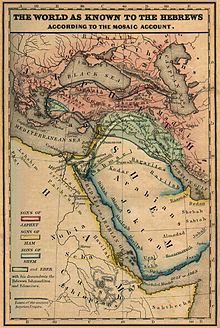- Meshech
-
For the Hebrew captive of Babylon originally named Mishael, see Meshach.
 The World as known to the Hebrews. This 1854 map [1] locates Meshech together with Gog and Magog, roughly in the southern Caucasus.
The World as known to the Hebrews. This 1854 map [1] locates Meshech together with Gog and Magog, roughly in the southern Caucasus.
In the Bible, Meshech (משך [meˈʃex] "price" or "precious") is named as a son of Japheth in Genesis 10:2 and 1 Chronicles 1:5.
Another Meshech is named as a son of Aram in 1 Chronicles 1:17 (corresponding to the form Mash in Genesis 10).
Interpretations
Meshech is named with Tubal (and Rosh, in certain translations) as principalities of "Gog, prince of Magog" in Ezekiel 38:2 and 39:1, and is considered a Japhetite tribe, identified by Flavius Josephus with the Cappadocian "Mosocheni" (Mushki, also associated with Phrygians or Bryges) and their capital Mazaca. In Hippolytus of Rome's chronicle (234 AD), the "Illyrians" were identified as Meshech's offspring. In addition, Georgians have traditions that they, and other Caucasus people as well as Armenians, share descent from Meshech (Georgian: Meskheti), Tubal, and Togarmah.
In 1498 Annio da Viterbo published fragments known as Pseudo-Berossus, now considered a forgery, claiming that Babylonian records had shown a son of Japheth called Samothes had begun settling what later became Gaul in the 13th year of Nimrod. Later historians such as Raphael Holinshed (1577) identified Samothes as Meshech, and asserted that he first ruled also in Britain.
Beginning from the 16th century, some European scholars proposed the idea that the Muscovites had stemmed from Meshech. Sir Walter Ralegh (c. 1616) attributes this opinion to Philipp Melanchthon (1497–1560) and to Benito Arias Montano (1571), and it was also followed later by Jonathan Edwards (1703–1758). Moreover, according to a legend first appearing in the Kievan Synopsis (1674),[2] Moscow (Moskva) was founded by King Mosokh son of Japheth (i.e. Meshech), and was named for him and his wife, Kva. In this legend, they are also said to have had a son, Ya, and daughter, Vuza, who gave their names to the nearby Yauza river.[3]
References
- ^ From Historical Textbook and Atlas of Biblical Geography by Coleman (1854)
- ^ «История российская» В. Н. Татищев (Russian)
- ^ The First Records of Moscow
See also
- Moschoi
Descendants of Noah in Genesis 10 Shem and Semitic Ham and Hamitic Japheth and Japhetic Categories:- Hebrew Bible nations
- Torah people
- Japhetic
Wikimedia Foundation. 2010.
